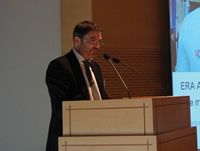This was among the many salient points made by Bas Groeneweg, director of Netherlands-based PerfoTec, addressing guests at an open house and seminar, hosted by the MapFlex joint venture (JV) between Astrapak’s Knilam operation and Afripack’s Kenyan operation. The event was attended by fresh produce growers, packers and retailers, all keen to understand the way to extend shelf life of fresh produce.
By way of clarification, surprise news (disclosed at Propak Africa 2013) was the formation of this JV by the two packaging giants (Astrapak and Afripack) and their investment in PerfoTec’s world-leading modified atmosphere packaging (MAP) technology. The destination for that first African PerfoTec installation was the MapFlex operation in Kenya, a sub-story whose roots go back to 2011 when Afripack in partnership with General Printers acquired a share in Dilpack in Nairobi, Kenya, in a move facilitated by Afripack’s Dutch partner, Dillewijn, a British Retail Consortium (BRC)-accredited producer of cut flower and fresh produce packaging.
As Afripack’s James Hynd now relates, the MapFlex operation was born out of Afripack’s desire to move into a fresh niche market in the flexible packaging sector. ‘We were attracted by Astrapak’s Knilam operation and its dedication to MAP technology; and our broad strategy was to take advantage of considerable growth opportunities in perishable foods, in Kenya and South Africa, and on export markets,’ James explains.
Undoubtedly, the JV has been a tremendous success; and investment in that initial PerfoTec system has quickly been recouped as a result of reduced waste and improved sales.
PerfoTec comes to Cape Town
Against that backdrop, today’s news is the commissioning of Africa’s second PerfoTec laser-based micro-perforation system, this time at the Knilam operation in Cape Town, which is now home to the South African MapFlex operation. (As a journalistic aside, it seems the names Knilam and MapFlex are now interchangeable!)
Moving from semantics and matters of corporate structure to a review of the MAP technology itself, the sophisticated PerfoTec system creates minute breathing holes in film and bags used to package fresh produce – achieving superior in-transit and on-shelf quality for perishable foods.
For many years, Knilam has been the market leader in MAP technology in South Africa. The business has a blue-chip customer-base, an enviable market reputation and BRC accreditation confirms world-class production and safety standards.
Says technical guru, and leader of the MapFlex JV in Cape Town, Jurie Cilliers, ‘Knilam has been a leader all the way. Our earlier home-grown technology for micro-perforation was fairly unsophisticated but, as the market evolved, we improved speed, accuracy and consistency; and in 2005 we made a significant investment in an imported Rofin high-speed laser-perforation system. This system has since been upgraded and its performance further enhanced. Now, however, with the new PerfoTec system in place, we can claim to have the most sophisticated laser-perforation equipment in Africa and among the most advanced in the world,’ he says.
‘As MAP evolves, we need to invest in increasingly accurate and precise equipment. We’re taking another leap into the future with this latest wave of market-leading technology,’ Jurie maintains.
The new laser-perforation system brings a two-fold advantage. Firstly, it means that the South African arm of MapFlex no longer has to source PerfoTec technology from Kenya; and it brings a second laser system to the Cape Town plant, providing fail-proof back-up for local customers. In addition, the Cape Town is identical to the one in Kenya, providing further support and interchangeable resources.
How does it work?
Post-harvest shelf-life extension of fresh fruit and vegetables is an ongoing challenge for producers, packers and retailers alike.
Fresh produce continues to respire after harvesting, and it’s the control of this respiration rate within desirable limits that creates a modified atmosphere suitable for extending shelf-life. Fruit and vegetables need oxygen to stay fresh, but the amount of oxygen needed varies by type of produce and seasonal climate changes.
Key to the success of the PerfoTec system is the computerised respiration control system that measures the exact level of oxygen needed and adjusts the packaging accordingly with precision micro-perforation.
In Europe, several retail pilot studies, including Marks & Spencer, show that this precision leads to a reduction of in-store waste – often by as much as 50%.
This laser-perforation system has recently been re-engineered and the latest Fast respiration meter has been developed in conjunction with Dutch service provider TOP.
As demonstrated at the open house, this latest model is more compact than earlier models, mainly as it no longer contains an integrated refrigeration system. Experience shows that this is often unnecessary as the measurement usually takes place in a refrigerated environment.
This latest-generation of the respiration control and micro-perforation technology is a major step forward in extending – and optimising – the shelf life of fresh produce and reducing food waste – a matter of grave concern to growers, packers and retailers throughout the world.









![02 CAE 20th Anniversary [2018] ED](https://www.packagingmag.co.za/wp-content/uploads/2024/11/thumbs/epic-120x86/02_CAE-20th-Anniversary-2018-ED-120x86.jpg)